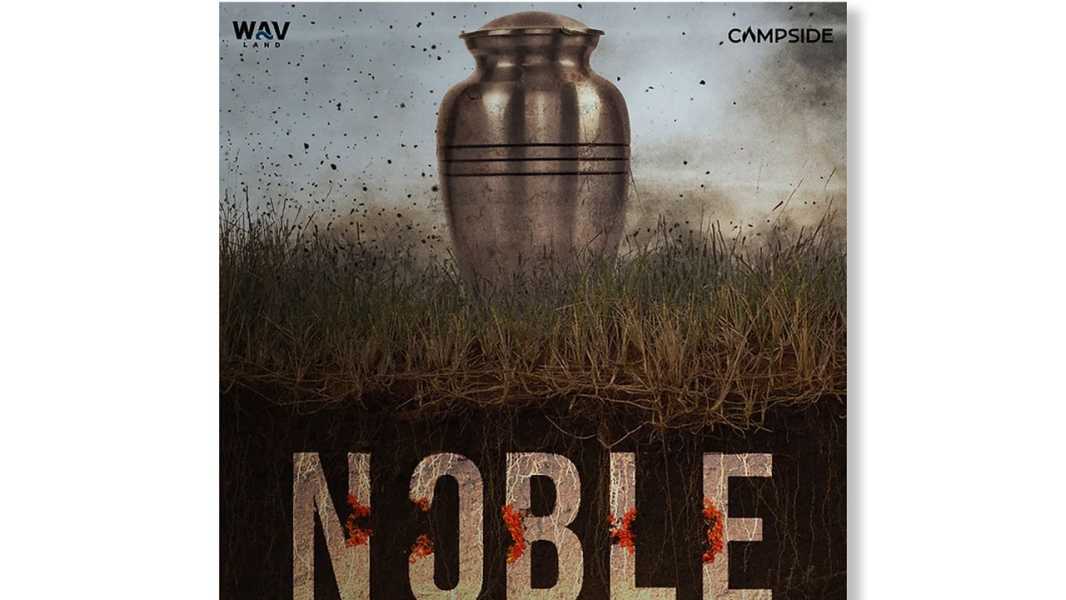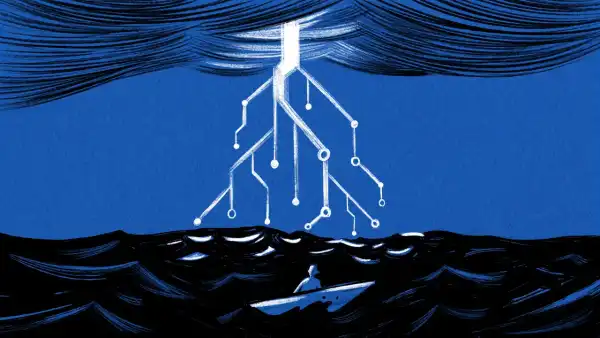
Save this storySave this storySave this storySave this story
How should the living treat the dead? More specifically, what should we do with their bodies, and why? The answers to these questions, like the mysteries of death itself, are at once straightforward and endlessly unsatisfying. The route of embalming, viewing, coffin, and burial, at this stage in history, can seem a bit too Egyptian pharaoh—comically false, a parade of pageantry and expense that only goes so far to mitigate the pain of loss. Cremation, ever more popular, seems comparatively simple and tidy; it’s not as simple as it sounds, though, and it also leaves you and your fellow glum ones with a symbolic, lightly disgusting satchel of bone dust, available for scattering or for use as a reliquary in your house or garage, forever. Anything other than granting the dead dignity, and then tucking their remains away in an unseen eternal sleep, can seem like a horror movie, the perpetrators like deranged monsters—even though, aside from matters of sanitation, the matter of what happens to dead bodies is largely symbolic. After all, they’re already dead.
The recent podcast “Noble,” from Wavland and Campside Media, unfolds like just such a horror movie—but a tasteful one, driven by the curiosity and respect of its reporter-host, the Atlanta-based journalist Shaun Raviv. It’s about the 2002 discovery of a scene at a family-run crematorium in small-town Noble, Georgia, which almost defies comprehension: dozens of dead bodies, unburned and unburied, scattered around a sixteen-acre property like scrap lumber. The story of what happened at the crematorium is as compelling as it is repulsive, and from the first moment, even from the content warning (“This podcast includes descriptions of death and decay. Please listen with care”), Raviv sets the right tone—direct and devoid of melodrama, with just the right amount of narrative context and perspective. “It takes twenty-eight gallons of fuel, and a spark, to burn a human body,” he begins. The body lies burning for hours, as the crematory furnace reaches sixteen hundred degrees, “as hot as molten rock.” Afterward, bones remain, and must be pulverized—“an imperfect process,” Raviv says, which leaves traces of bone in the machine. This brief description of the realities of body disposal leads us naturally to the Noble story, where imperfections run amok.
In October, 2000, Gerald Cook, a driver for a gas company in northwestern Georgia, was delivering propane to a crematorium that was not on his route; the usual driver had been too scared. “He just said it made him feel creepy,” Cook recalls. Cook turned at an engraved headstone that said “Tri-State Crematory,” proceeded down a long driveway, passed the house of the family that ran the business, and arrived at a wooded cul-de-sac with three small buildings. “It was very ragged, not maintained at all,” Cook says. Like Raviv, Cook has a gentle, rational-sounding voice; in the background, sparse violin music adds notes of anticipation. Cook saw “weeds and junk everywhere,” he says, and hearses, and caskets. He walked behind a building, looking for the propane tank, and saw a small tractor. “That’s when I looked down and seen that there was bones and bodies just pushed up in a pile of debris,” Cook says. “There was human body parts, and feet, and skin. I just remember a foot with skin and stuff still on it.” Just the foot? Raviv asks. “Just the foot,” Cook says. He stood there, unbelieving. Then he heard a voice: “Gas man! Gas man!” This was the crematorium’s proprietor, a tall, broad-shouldered, clean-cut young guy named Brent Marsh. Cook played it cool with him, trying to convey that he hadn’t seen anything (“I acted dumb . . . talked very country”), standing with him in silence while filling the tank. Afterward, Cook drove around aimlessly for half an hour, stunned.
Cook’s visit was the beginning of a years-long process of discovery, disbelief, and consequences surrounding the goings on at Tri-State Crematory, which the Marsh family had owned and operated for two decades. The Marshes, who are Black, were well known and respected in their small community. There was Ray, the crematorium’s successful owner; Clara, a demanding high-school English teacher; their daughter, who is not named in the series; and their son, Brent, a deacon in training who’d played football in high school and college. Five years earlier, Ray Marsh had had a stroke, and Brent had left college to take over the business. That’s when the trouble began.
“We treat dead bodies like they’re precious, sacred even, but we’re also revolted by them—the way they smell, the way they look,” Raviv says. The gas man, upon seeing what he saw, “almost vomited,” but he was also concerned that the bodies “weren’t being treated properly.” Throughout, Raviv’s writing deftly blends insight and observation with the unfolding horror of the narrative; his interviewees match that tone, calmly but sensitively recalling the details as they perceived them. (Some of this is likely enhanced by the passage of time.) Many seem to want to give Brent Marsh the benefit of the doubt, even if they can’t fully understand what that might mean. Cook reported what he saw to his employer, who visited the sheriff, Steve Wilson. “I think I thought, you know, Oh, shoot, he’s got behind a day or so, and he’ll get caught up,” Wilson recalls. “Unfortunately, it turned out that wasn’t the case.” Wilson sent deputies to look around, and they apparently didn’t see anything; he didn’t pursue it further. Cook made another delivery a year later and saw another decomposing body on the ground. This time, he told his aunt, who worked for the F.B.I., and who tipped off Robin Hedden, in the E.P.A. investigations division. Hedden and a colleague approached the Marshes’ property through the woods and discovered a human skull in a thicket. They immediately called in other local officials, including Greg Ramey, an investigator for the Georgia Bureau of Investigations, who knew of the Marshes and intended to be cremated by them someday. Ramey imagined that the skull discovery was a birthday prank staged by his buddies. But, as he explored the grounds, he found more bones in the woods—fingers, toes—and at the crematory asked Brent to open the buildings. Inside, Ramey saw bodies everywhere he looked, dressed or undressed, in various stages of decomposition. He saw skeletons, stray bones; he saw bodies of people he knew.
“I’m, like, ‘Brent, what is going on?’ ” Ramey recalls. Marsh looked resigned, mumbling something—he didn’t seem to get what was going on, either, but he knew he’d been caught. The officials didn’t arrest him right away; they sent him home while they figured out how to proceed. Their over-all feeling, besides horror, seems to be sadness about the whole situation. That first day, they counted forty bodies; by the time the count stopped, months later, it totalled three hundred and thirty-nine.
The central mystery in “Noble,” for those involved and for us, is why—or, as Ramey also recalls asking Marsh, “Brent, what’re you thinkin’?” For a while in the series, the motive remains an enigma, as does Marsh. But signs indicate all along that his actions were egregiously hapless, not intentionally sinister. After his father’s stroke and another worker’s resignation, Marsh was a one-man operation tasked with picking up corpses from funeral homes in three states, cremating them, and returning ashes, for cheap; he also rented out tents and chairs for weddings and funerals. Of all those jobs, the unseen, nonpublic-facing one—the actual cremation—began to get short shrift. (Some ashes he returned were of uncertain origin, or cement dust.) Listeners may experience a dual horror in hearing this story: that of discovering such a thing and that of being discovered. If you’ve ever fallen behind, felt shame about something, or stuffed clutter into a closet before a party, the idea of being found out to the extent Marsh was—a scenario that an anxious brain might conjure up as a nightmare during sleep—is deeply unsettling in itself, a near-literal metaphor of someone finding skeletons in your closet.
As the episodes proceed, we learn about the grisly, interminable process of accounting for the remains—eight mass graves, a six-million-gallon lake that the authorities had to dredge, millions of dollars of FEMA money, legions of responders working around the clock—as well as the emotional and legal ramifications, for the bereaved and for Brent Marsh, who eventually went to prison. We meet characters including Sheila Manis, whose late husband’s body was mishandled by Tri-State, and who describes scattering his ashes on his favorite mountaintop, visiting the spot for years afterward, coffee cup in hand, to spend time with his memory, and discovering that she’d been communing with cement dust. She felt betrayed; she felt she’d let her husband down.
We also meet McCracken Poston, Marsh’s colorful defense lawyer (“Four times the time since Jesus walked the Earth is excessive,” Poston says, after the prosecution suggests an eight-thousand-year sentence); Terry Crawford, a grieving nurse who quit her job to help the recovery effort, and who thinks that the count was stopped prematurely, when the FEMA money ran out; and a pair of best friends from southern Georgia, the coroner Michael Fowler and the funeral director Cedric Hill, who serve on the national Disaster Mortuary Operational Response Team. Fowler and Hill were deployed to Noble shortly after working at Ground Zero post-9/11. “I think God had to give you a special gift to do what we was doing,” Fowler says. Like the Marshes, and unlike many people in the podcast, Fowler and Hill are Black, and they bring welcome perspective to the story. “I will say that we were certainly in redneck country, I’ll be honest with you on that one,” Hill says. He didn’t feel threatened in Noble, but he did feel pressure—a heightened sense of responsibility to show “a Black man on the positive side,” he says. “I felt like I carried a bloodstained banner in that respect.” The incident caused a special kind of shock in the local Black community, he adds, and it also cast unwelcome doubt on the funeral industry in general. Meanwhile, as the months and years went by, the entire region tried to make sense of what happened, both to their loved ones’ bodies and in Brent Marsh’s head.
As I listened to “Noble,” I found myself returning to thoughts of “S-Town,” the 2017 podcast from Brian Reed and Serial Productions. They’re very different—for one, “S-Town” was a contemporary character study, not an elucidation of a historical news story—but there are commonalities of detail and mood, from their rural Southern settings and enigmatic central figures to mentions of mad-hatter syndrome. Both grapple with issues of sensitivity and invasiveness, which “Noble” manages straightforwardly and thoughtfully, and which “S-Town” sometimes mishandled, then obfuscated with aesthetic sophistication. Reed’s new series, “Question Everything,” starts with his being rigorously grilled about some of those choices by the veteran journalist Gay Alcorn, who in 2017 published a piece called “S-Town Never Justifies Its Voyeurism, and That Makes It Morally Indefensible.”
Raviv’s series doesn’t invite such philosophizing; he seems to have carefully considered the bounds of his project and avoided the common podcast missteps that would transgress them. He doesn’t center himself as a character; he keeps the focus on the subjects. He’s unflinching about the details of death, revealing what feels like a secret, hidden realm, but the dead themselves are presented as people who had lives and personalities, not just as mistreated corpses. Raviv mentions wanting to avoid violating the Marshes’ privacy, and he doesn’t voice wild speculations about their actions or include audio of others doing so. When he brushes up against the limits of his access, in the final episode, and wants to approach Marsh and his mother, he goes to Noble and navigates the encounter with respect and care, which he gets in return. Incredibly, this scene adds a sense of healing and doesn’t feel like a stunt. It’s a refreshing contrast to the way in which many other podcasts have handled limited access or limited solutions. Journalists and documentarians can be tempted to prioritize narrative over ethics, pursuing a good story at any cost; “Noble” shows that prioritizing ethics can enhance the narrative. By its conclusion, the mystery of why is solved well enough; Sheila Manis and others have made their peace with Brent Marsh; and Marsh, now paroled, leads a quiet life as a pastor. Only the lingering mysteries of life, death, and bodies remain, like particles of bone dust in a pulverizer. ♦
Sourse: newyorker.com






